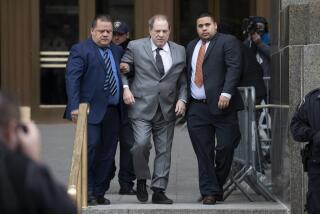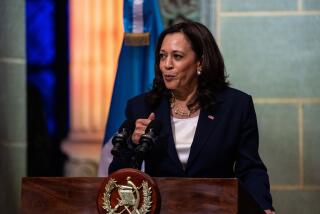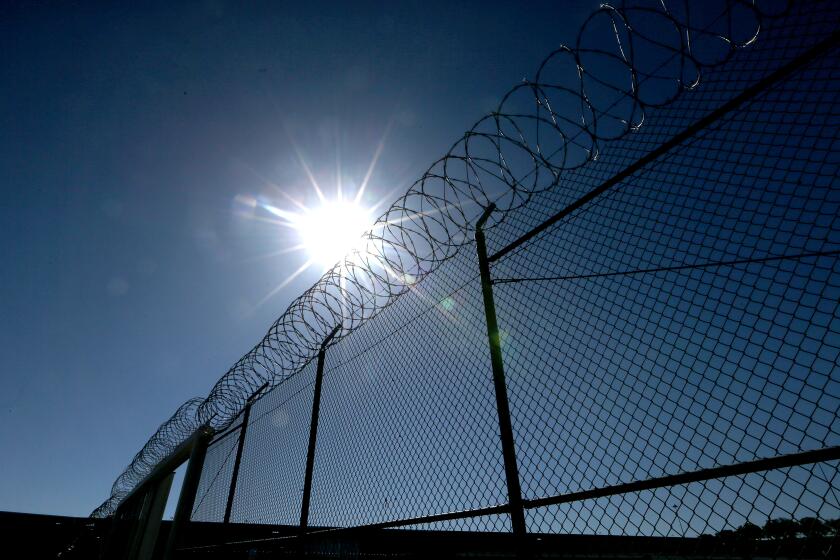Testimony Ends : Carried Out North Orders, Secord Says
Richard Secord, ending four days of testimony before congressional investigators, said he carried out Oliver North’s orders to divert money to the contras without discussing it with anyone else in the White House.
The retired Air Force major general, after more than 17 hours in front of the panel and television cameras, said he directed the scheme to sell U.S. arms to Iran and send military hardware to the contras on North’s orders--and only infrequently discussed the operations with national security directors Robert C. McFarlane and John M. Poindexter or CIA Director William Casey.
He never talked with President Reagan about the initiatives, he said under cross-examination.
Secord freely offered his opinion of how the Administration handled the affair once it became public and the hearings in which he starred for four days in the first week of hearings, expected to stretch into the summer.
‘Laughing at Us’
“In my opinion, the whole world is laughing at us” as the congressional hearings “open up our guts to the rest of the world,” Secord said.
He said he also believes the White House sacrificed North, the fired National Security Council aide, and Poindexter to calm the firestorm touched off by Atty. Gen. Edwin Meese’s Nov. 25 revelation of the contra connection.
During his four days of variously riveting, contentious, tedious and humorous testimony, Secord painted himself as a private arms dealer motivated only by patriotism and not profits and working at the behest of the U.S. government.
The hearings adjourned at 2:20 p.m. PDT Friday and are scheduled to resume Monday at 10 a.m. with McFarlane as the witness.
Basis for Belief
Under questioning by Rep. Edward P. Boland (D-Mass.), Secord stressed that he believed his activities were known and approved by the Administration.
Asked the basis for that belief, Secord said he discussed his Iranian arms missions with Poindexter, McFarlane, Casey and North.
“Did you, you never discussed this contra diversion with the President of the United States, did you?” asked Sen. Sam Nunn (D-Ga.)
“No sir,” Secord said.
“So the only person that ever in any way discussed with you diverting funds to the contras was Oliver North?” Nunn asked.
“That’s right,” Secord responded.
Asked by Rep. Bill McCollum (R-Fla.) why private operations were used for the Iran arms deals and the contra supply effort, Secord said the Administration, including “the President . . . made these decisions. There was great frustration with official channels.”
“The President and his advisers had to rely on something unconventional” to do the job, Secord said.
North Files Papers
Four blocks away, North, the scandal’s central figure and Secord’s government link in the initiatives, went to the federal courthouse to file papers relating to a federal grand jury probe of the affair.
Secord wrapped up his last day admitting, “I am tired; I am super tired” of allegations that he was a profiteer who raked in millions of dollars for his private use from the Iran-contra affair.
Secord acknowledged that he had lost his temper during some of the questioning but said he attempted to be truthful “to the best of my knowledge” and noted he came forward voluntarily.
“I’ve answered your questions in good spirit and I understand the need of the committee to dig in as deep as you can and get to the facts,” he said in a brief closing statement.
‘Full Responsibility’
“If criticism is in order, I’ll accept it. If others believe I’m deserving of credit, I’ll accept that too. I also accept full responsibility for my operations and conduct.”
He opened the hearing by revealing seven bank accounts that he holds with his wife, in an apparent demonstration of his now-precarious financial condition.
He also said he would refuse to touch any of the $8 million in profits remaining in a secret Swiss account, which many on the committee contend holds U.S. taxpayer funds. Secord has maintained that they were private monies he used on behalf of the government.
He suggested that the profits be donated to a newly created fund in the name of Casey to provide aid for the contras. Casey died last week, 4 1/2 months after brain-cancer surgery. Secord said he reached the decision “because I’m sick and tired of being badgered about this, being beaten on the head about this.”
Secret Dealings
In fact, much of the four days of testimony focused on Secord’s secret business dealings and the millions of dollars that passed in and out of secret Swiss accounts.
Sen. Paul S. Trible Jr. (R-Va.) told Secord, “You wrapped yourself in these activities in the American flag in an attempt to justify what you’ve done.”
“Today, your actions and your testimony are being judged by 200 million Americans,” Trible said. “Some people are going to believe you are a patriot and others will believe you are a privateer.
“I think you are both,” he said. “I think you are a man who pursued national interests as he saw it because he loved his country but also a man who pursued, at the same time, enormous profit.”
Profits Channeled
Rep. Dante B. Fascell (D-Fla.) asked Secord to recall the events of Nov. 25 when Meese revealed that profits from the U.S. arms sales to Iran had been channeled to the contras.
That day Poindexter, the national security adviser, and North, his key aide, were fired for their involvement in the scandal. Secord again said he that he had tried to persuade Poindexter and North not to leave government, that they had done nothing wrong. And, he said, “I urged on several occasions that the President go public and preempt the gathering storm.”
Fascell asked: “You believed you had done nothing wrong.”
Secord: “I naively held that view.”
‘I Share That View’
Fascell recalled that at that time, he said he believed North and Poindexter had been “sacrificed” in the Administration’s immediate damage-control efforts.
“I tend to share that view. I guess that’s obvious,” Secord responded.
Rep. William S. Broomfield (R-Mich.), an Administration loyalist, asked Secord what he believed was the effect of the hearings in which revelations about secret deals, Swiss bank accounts, false names and clandestine meetings have surfaced daily.
He said covert operations are a necessary part of effective foreign policy in “a dangerous world” but the publicity has fostered distrust of the United States by its allies around the world.
More to Read
Get the L.A. Times Politics newsletter
Deeply reported insights into legislation, politics and policy from Sacramento, Washington and beyond. In your inbox three times per week.
You may occasionally receive promotional content from the Los Angeles Times.






